Table of contents
Do you know the benefits of garlic?
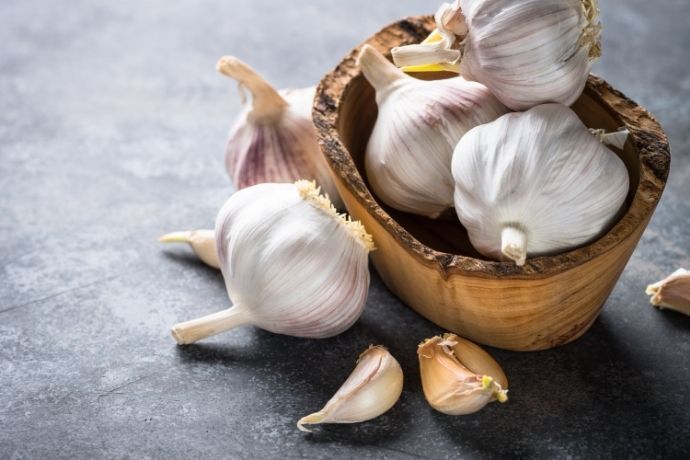
In this article, we will see the impressive range of benefits provided by the bulb of the plant Allium sativum, popularly known as garlic. Used as a seasoning since ancient times, but also highly valued for its medicinal properties, garlic is versatile both in the types of gastronomic preparations as for its positive action for health.
Among the benefits of garlic are the protection of the organism, because it increases immunity, the prevention of colon cancer, the strengthening of the heart, the reduction of blood pressure, among many other curative and preventive potentialities.
We will also approach its antimicrobial properties, anti-inflammatory and vermifuge, and we will know varied forms of use, as well as its contraindications and guidelines for consumption. Follow.
Understanding more about the garlic food
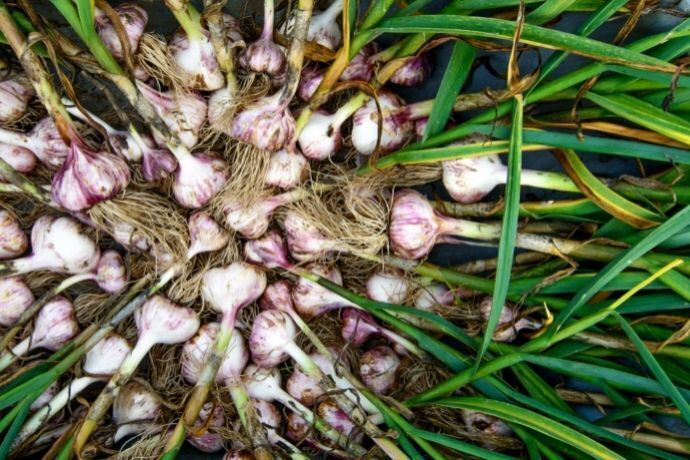
In order to better understand the benefits and properties of garlic, we will take a walk through its origin and history, also addressing functions and characteristics of this plant. Check it out.
Origin and history of garlic
In ancient Egypt, garlic was already one of the plants cultivated especially for the purpose of composing medicines. It is estimated that the origin of this plant is the Middle East, but some scholars point to an ancestral version of garlic originating in Central Asia.
Despite its controversial origin, its most remote cultivation dates back 6,000 years. Although it has been widely used by various cultures in Asia, Africa, the Middle East and Europe for its medicinal value, curiously, garlic was only valued for its gastronomic potential after many centuries.
Because of its marked flavor and characteristic odor, it was considered a seasoning of the poor, avoided in the dishes of the aristocracy.
What is garlic used for?
Garlic has two historically well marked functions in all cultures of antiquity, and its introduction in the Americas is also characterized by these functions: gastronomic and medicinal.
The culinary use of garlic is quite versatile and it is always a remarkable presence in a dish, due to its outstanding flavor, but also its intense odor. It can be eaten raw, sauteed, chopped or crushed, in combination with other vegetables or in the role of seasoning meat and other savory dishes.
Its medicinal function is very broad, and ranges from strengthening immunity to preventing diseases such as cancer. Garlic is said to be an excellent ally of the heart.
Garlic characteristics
Garlic is considered a perennial plant, that is, it has a long life cycle. The garlic plant has elongated and narrow leaves and can reach up to 60cm in height. The part of the plant that we call garlic is its bulb.
It is characterized by a round or oval shape, and formed by a series of teeth, which can range from 5 to 56, the bulbils. The thin shell covering the teeth is called bract.
It has a white, pinkish, reddish, violet, purple or even brown coloration, depending on the variety. Garlic exudes an intense aroma due to the presence of a sulphurous substance known as allicin.
Garlic properties
The properties of garlic make it an excellent phytotherapeutic vegetable, in addition to its gastronomic qualities. It has a high nutritional value in calories, carbohydrates and proteins, containing phosphorus, potassium, calcium, magnesium and vitamins (A, B1, B2, B6, C, E).
Its properties are comprehensive, and garlic delivers benefits such as analgesic, antiseptic, antiviral, antifungal, anti-inflammatory, antimycotic and antibacterial, as well as anticoagulant.
In addition, it has diuretic and antioxidant action, being effective in controlling cholesterol, also acting against amoebas and protecting against colds and flu. Its properties make it a food that helps control hypertension. Its regular consumption helps increase immunity.
Benefits of garlic
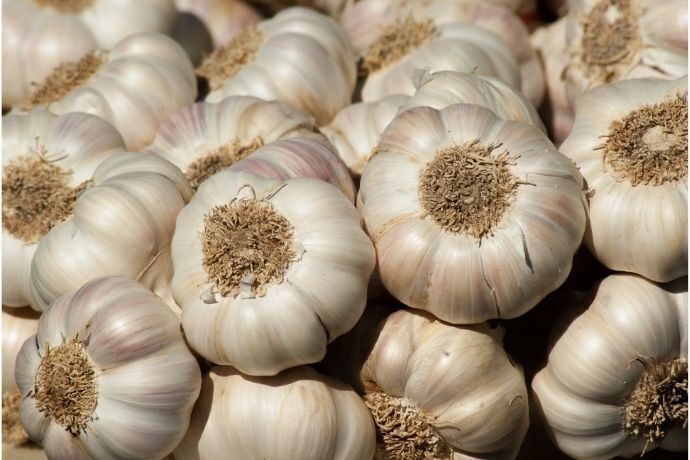
Let's know below the main benefits of garlic, which are multiple and contribute to the health of the body in general, preventing various diseases.
Increases immunity
Among the various benefits of garlic for the body, its important immunostimulant function stands out. Garlic is an effective plant in stimulating immunity because it contains the substance known as allicin, in addition to important minerals and vitamins.
Allicin has antioxidant action, preventing the action of free radicals, which is essential for the body to prevent and combat numerous diseases. In addition, allicin helps prevent the hardening of the arteries, also inhibiting the growth of harmful bacteria, viruses and fungi.
The immunostimulant effect of garlic is potentiated when the food is eaten raw, and one option is to use it in the preparation of pastes and as a salad dressing.
It has antimicrobial action
The antimicrobial action of garlic classifies it as an excellent natural protector against the harmful effect of microbes on the body. Consuming garlic regularly is a good way to avoid, through food, the proliferation of various microagents harmful to health.
A study from Cardiff University in England, led by researcher David Lloyd, reinforces that garlic can be used as a natural antibiotic, and it is suggested that garlic could have its use expanded even as a decontaminant after chemical weapons attacks.
Other research shows that the effectiveness of garlic extends to germs, fungi and protozoa, this due to the powerful action of allicin.
Helps in the treatment of worm infections
Studies that sought to delve into the combative capabilities of garlic against harmful agents concluded that the presence of allicin, the substance responsible for the strong odor that this vegetable exudes, is what prevents the progression of worms, bacteria, protozoa and fungi in the body.
Consumed raw or added to olive oil, garlic preserves its vermifuge properties, and adding it to your daily diet is an excellent way to stay away from intestinal worms.
Garlic tea is also an interesting option for this purpose. The vermifuge properties of garlic have even been studied as a solution for the elimination of worms in animals.
Prevents colon cancer
Garlic is considered an excellent food for the prevention of colon cancer. The WHO (World Health Organization) recommends daily consumption of at least 1 clove of garlic, for this purpose.
This amount added to the menu also proves to be effective as an ally in the prevention of other cancers, such as stomach, lung and breast. There are numerous studies that evaluate the immense capabilities of garlic to improve health through regular consumption in the diet.
These studies point out that allicin, garlic's active ingredient, is able to act in the DNA of cells and prevent genetic mutations. In addition, allicin acts in existing tumors, affecting 332 proteins that form these tumors.
Improves heart health
Garlic is well known for being a "heart-friendly" condiment. Whether consumed as a herbal medicine, in capsules, teas and essences, or directly in the diet, preferably in natura, garlic actually acts to preserve heart health and prevent the onset of problems.
To begin with, its beneficial substances act to prevent clogging of the arteries. Allicin, an active ingredient present in garlic, is responsible for a considerable reduction in bad cholesterol and triglycerides.
In addition, it lowers blood pressure, promoting vessel relaxation. Being rich in antioxidants, garlic also prevents thrombosis.
Relieves inflammatory diseases
Garlic is a powerful natural anti-inflammatory. This ability is behind its auxiliary use in anti-flu treatment, but also in the prevention of stomach cancer.
Research on the anti-inflammatory potential of garlic has indicated that it exerts an action similar to that of the drug Ibuprofen, and is also effective in combating fever. Consuming one clove of garlic per day is enough to ensure these benefits.
In order to preserve the positive effects of allicin, phytochemical responsible for this medicinal function of garlic, give preference to garlic in natura, that is, consume it raw, added to pesto sauce, in paste or chopped to season salads.
Prevents respiratory diseases
The various natural components of garlic, such as minerals and vitamins make it an essential element in your daily menu.
Allicin, a phytochemical with great anti-inflammatory, antiviral and immunity-boosting action, makes the constant consumption of garlic a guarantee of protection against several diseases, including respiratory ones.
Studies have proven that garlic helps protect the lungs, being a fundamental inclusion in the diet of smokers, for example, since it decreases the risk of cancer by up to 30%.
This percentage extends to 44% for the non-smoking population (Jiangsu Provincial Centre for Disease Control and Prevention). In addition, regular consumption of garlic helps relieve asthma symptoms.
Helps brain health
Garlic is one of the most powerful vegetables for health, with regard to its mineral wealth and the presence of other beneficial substances, such as vitamins and allicin. The inclusion of garlic in everyday food helps in the prevention of diseases such as Alzheimer's and dementia, for example.
Its properties have a neuroprotective function, i.e., they act against damage to the nervous tissue. A study focusing on the analysis of the effect of garlic extract (Nutrients Magazine) found that it acts to attenuate some degenerative changes in the brain.
By fighting free radicals and being antioxidant, allicin also helps against cell aging.
Reduces blood pressure
Among the various notable effects of the constant consumption of garlic, its antihypertensive action is proven, that is, its ability to reduce blood pressure, stabilizing blood flow and also helping to prevent thrombosis.
The National Health Surveillance Agency (Anvisa) recommends the ingestion of garlic capsules as a coadjuvant treatment for those suffering from hypertension.
However, people who have low blood pressure should avoid this type of consumption, since the components of garlic act to induce pressure drop. Pregnant and lactating women and children under 4 years should also avoid the capsules.
Contributes to skin health
The antioxidant, antibacterial, anti-inflammatory and antifungal properties of garlic make it a special asset for those who value skin health care. The presence of allicin ensures effective combat against free radicals and oxidation of cells.
Thus, garlic can be considered an agent for the prevention of photoaging, while it also contributes to tissue regeneration and the reduction of skin blemishes and redness.
The fungicidal and bactericidal functions of garlic make it an excellent ally against blackheads and pimples. If eaten raw, its nutritional richness will be better used by the body.
How to use garlic food
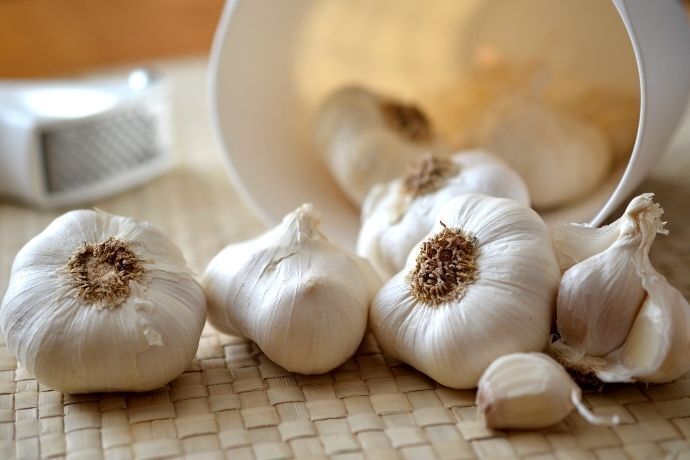
We will get to know several ways to use garlic food, discovering how to add it to our daily menu. In addition, we will see the recipe for a powerful tea, as well as the garlic water, so rich in nutrients. Check it out!
Ways to consume garlic
Whether in cooking, as a seasoning or component of dishes, or as a medicinal agent, with the purpose of helping to combat and prevent various diseases, garlic is an indispensable ingredient.
It is true that its benefits are potentiated through raw consumption, but there are those who do not like the intense and slightly burning flavor, characteristic of this vegetable.
This is not a reason not to consume it, however, because garlic can be added to olive oils, pastes and pâtés, sprinkled on salads, sauteed in sauces, and as a seasoning for meat and fish. In addition, teas, waters and extracts, and even the capsule version make up the consumption options.
Garlic tea recipe
Garlic tea is an extremely healthy and effective option to combat various symptoms, such as the flu, for example, because its expectorant properties help release excess mucus, in addition to reducing lung inflammation, a healing process stimulated by the presence of the phytochemical allicin.
Another benefit of garlic tea is that it is a powerful diuretic, helping to eliminate toxins and acting against fluid retention.
In addition to all these reasons, regular intake of this tea strengthens immunity, reduces cholesterol and triglycerides, as well as blood pressure, also improving circulation. We will see a special recipe for preparing a good garlic tea.
Ingredients and how to make
We will get acquainted with an excellent recipe for garlic tea with honey, which serves as a sweetener. You will need 3 cloves of garlic, 1 teaspoon of honey and the volume of one cup of water (about 200 ml).
Boil the water with the garlic cloves, over medium heat, and keep on the heat for 3 minutes after boiling. After removing from heat, strain the tea and add the honey, mixing well.
Garlic water
Garlic water can be easily prepared and is a very practical anti-inflammatory and antiviral drink to consume Garlic without losing its nutrients. Nutrologists point out that the best way to take this water is on an empty stomach.
This causes the body to be hydrated while receiving the beneficial properties of the vegetable.
It is important that the garlic in this water is fresh, that is, raw, and cold water is recommended, because at this temperature the nutrients remain active. We will see a recipe for garlic water to take in the morning and at various times of the day.
Ingredients and how to make
The basic ingredients for this recipe are: 100ml of water and 1 clove of garlic (crushed). You can add some spices that flavor the water and still deliver additional benefits.
We recommend cinnamon, ginger, rosemary and clove. Another ingredient that can be added at will is lemon. To prepare, mix the ingredients and let the drink stand for about 8 hours before serving. This drink can be sweetened with honey.
Garlic capsules
Garlic capsules are dietary supplements that deliver the anti-inflammatory, antiviral, antifungal and expectorant actions of garlic, especially for people who do not like to eat this food raw.
Garlic capsules are also recommended for those who need to reduce cholesterol and triglycerides, and also for those who want to reduce blood pressure in a herbal way.
However, nutrologists do not recommend the consumption of this product for those with low blood pressure, for pregnant and lactating women, children under 4 years old and people who are pre or postoperatively, since concentrated garlic can alter blood clotting.
Further information on garlic
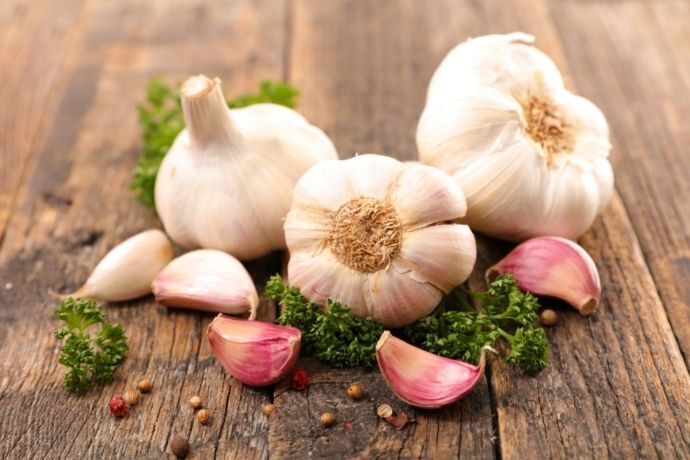
Relevant information about garlic helps us to consume it consciously and properly. Get the following information about optimal consumption, such as frequency, contraindications, side effects, storage, and organic options.
How often should garlic be ingested?
Opinions regarding the limit quantity of garlic to be consumed daily vary. Some nutrologists recommend the consumption of up to 3 cloves of garlic per day, which corresponds to 4g, while others extend the limit to up to 10g.
The recommendation of the American Dietetic Association is 600 to 900 mg daily. The important thing, however, is to consume this food moderately, but regularly, that is, to integrate it into your daily diet.
Thus, garlic should be consumed daily to stimulate immunity and present effective action against several diseases, being a way to prevent them, in combination with the adoption of other healthy habits.
Contraindications and possible side effects of excess garlic
Garlic helps in the prevention and treatment of diseases. However, excessive consumption is not indicated because it can cause gastric problems, besides bad breath.
People with Irritable Bowel Syndrome (IBS), as well as those with any gastric disorders, should avoid consuming raw garlic, preferring it to be added sauteed or roasted to the diet.
People who suffer from blood clotting disorders should also stay away from garlic. And, for the general population, this is a food that, in excess, especially in natura, can cause vomiting and nausea, besides discomfort and abdominal pain.
How to buy and how to store garlic?
We find two types of garlic in supermarkets and fairs, the white and the purple variety. In order to choose well which garlic to take home, give preference to garlic with the peel, which ensures the longevity of the food, besides preserving it from contamination.
Choose garlic heads that are firmer, that is, realize that dark spots and softened cloves indicate that the garlic is not fresh. Garlic storage is important to make it last longer.
Store it in a ventilated place, but without incidence of sunlight. Do not store garlic in closed containers, at the risk of mold. You can also keep it frozen by wrapping it in plastic wrap and keeping it in the freezer.
Why give preference to organic garlic?
Garlic is a potent food for health, being an extremely practical and beneficial item to be integrated into your daily menu. But it is important to choose food well, taking into account its form of production.
This means valuing organic food, which does not contain pesticides in its cultivation and offers nutrients in a purer way. In addition, the production of organic food aims at quality in all stages, ensuring more nutritious and tasty food.
Another relevant factor is that growing organics promotes respect for the environment by not using toxic components, while assisting in the socioeconomic improvement of rural communities.
Garlic has several benefits!
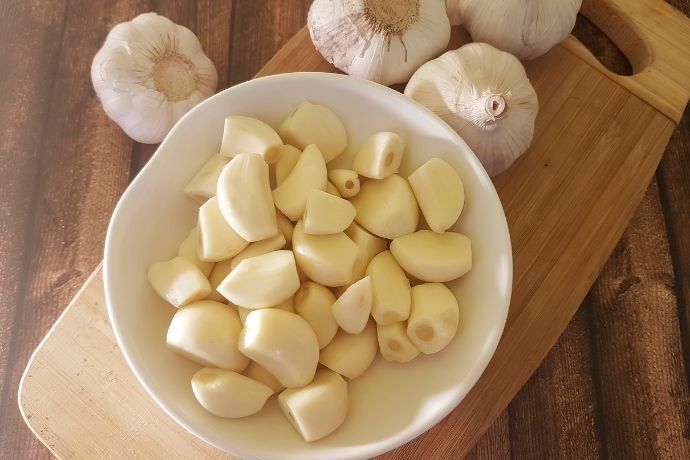
Garlic consumption is proven to be beneficial for preventing against various diseases, and its properties fight everything from heart problems to respiratory symptoms.
Since ancient times, the ways of consuming garlic have been varied, which makes it a really versatile option for the daily diet. It can be eaten raw, boiled or roasted, as a special component for sauces and pastes, or even in chips to season salads.
Other forms of consumption include garlic tea and water, in addition to extracts and capsules produced in laboratory, which serve as food supplements. Garlic is considered by nutritionists a superfood, because of its powerful bioactive compounds, that is, it is an ally of your health. Choose the form that best suits your routine and enjoy the benefits!

